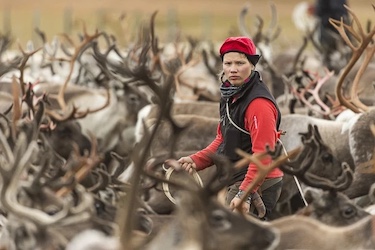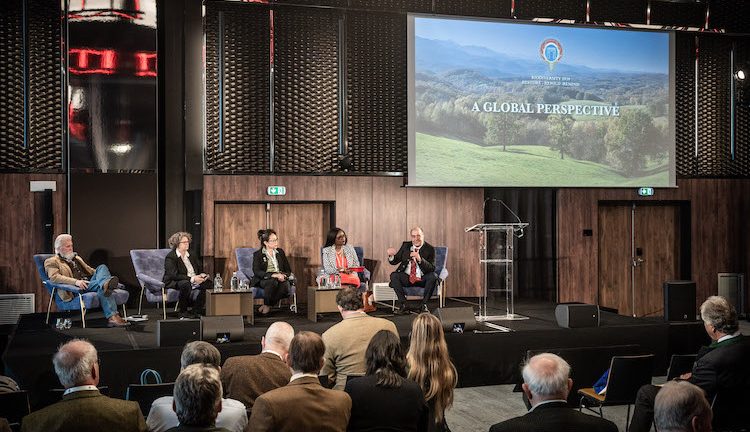By Aurora Weiss
VIENNA 7 July 2023 (IDN) — The 2030 Global Biodiversity Framework (GBF) was adopted last December by the 196 State Members of the Convention on Biological Diversity (CBD). It was the first international conference designed to move into the implementation of GBF and to support the UN Decade on Ecosystem Restoration. Biodiversity was also the topic of the 69th International Council for Game and Wildlife Conservation (CIC) from 20-23 April 2023 in Paris.
CIC addressed other global targets and frameworks that contribute to conservation and sustainable development, such as the UN Sustainable Development Goals (SDG), the Convention on International Trade in Endangered Species of Wild Fauna and Flora (CITES), the Convention on Migratory Species (CMS), the Ramsar Convention on Wetlands, the World Organisation for Animal Health (WOAH) and the African-Eurasian Migratory Waterbird Agreement.
Goal 15 focuses specifically on sustainably managing forests, halting and reversing land and natural habitat degradation, combating desertification and stopping biodiversity loss.
The Global Biodiversity Framework includes four goals and 23 targets to be achieved by 2030 to support its vision that “by 2050 biodiversity is valued, conserved, restored and wisely used”. The world’s biodiversity finance gap is assessed at 700 billion USD annually. These funds should be secured from taxpayers mainly and spent wisely for saving and restoring biodiversity. For example, diversity of national hunting systems, yet united for the cause of wildlife conservation and sustainable use.
“Hunting renders a service to society while supporting countless livelihoods. Hunting is a nature-based solution critical to our current way of life: hunters not only manage and protect habitats but aid in the fight against poaching and contribute directly to the restoration of wildlife populations. Our mission is to promote this fact—to explain how hunting adds value to biodiversity and livelihoods. Let us not be side-lined or overlooked. As hunters—we are at the core of the biodiversity Agenda,” stressed CIC President Dr Philipp Harmer.
Biodiversity is directly associated with the global economy, especially forestry, fisheries, agriculture, and livestock rearing. A large percentage of the worldwide population now depends on natural resources for their livelihood. That’s why funding from non-state actors can bring the voices of indigenous peoples and local communities to the table in international policy-making processes.
The CITES Secretary-General Ivonne Higuero told IDN that this builds on the CIC’s recent work, which supported community representatives’ attendance at IUCN APAC 2022 and CITES CoP19. The resolution on this issue was to establish a Working Group on Indigenous People and Local Communities.

“The CITES measures regulating the international wildlife trade are designed to build back wild species populations so no animal or plant goes extinct due to international trade. Habitat loss and, in some instances, conservation successes combined with an ever-increasing human population has resulted in humans and wild animals living closer and sharing the same scarce resources.”
The conservation of animals is an important global good, but the reality is that those living with wildlife usually carry the cost associated with this conservation imperative, including loss of income, essential crops to support their livelihoods and tragically, sometimes also loss of human life, said Higuero.
“We should engage in consultations regarding the needs and concerns of wildlife-rich countries and explore innovative ways for the sustainable financing of wildlife conservation. Examining existing examples of financing solutions/initiatives in the wider environmental context may be useful for wildlife conservation on CITES-listed species,” stressed Higuero for IDN.
The International Consortium on Combating Wildlife Crime is the collaborative effort of five inter-governmental organizations. The partner agencies to ICCWC are the CITES Secretariat, INTERPOL, the United Nations Office on Drugs and Crime (UNODC), the World Bank and the World Customs Organization (WCO). Frontline officers from national agencies are responsible for wildlife law enforcement and prosecuting authorities who bring criminals engaged in wildlife crime to justice.

Shane Mahoney commented on the need to understand society on a deeper level to successfully communicate the successes of sustainable use. To achieve this, he said, there is a need to use concepts such as ‘One Health and the Wild Harvest’ initiative to communicate messages to wider audiences.
Mahoney is admired as a tireless worker for wildlife and a vocal proponent of sustainable use as a conservation tool. Today, he serves as Deputy-Chair of IUCN’s Sustainable Use and Livelihoods Specialist Group, International Liaison for the Wildlife Society, and President of the International Council for Game and Wildlife Conservation’s Policy and Law Division. He is also the Founder and Executive Director of the Institute for Biodiversity, Ecosystem Science and Sustainability, which continues to fund graduate student research at universities throughout North America and Europe.
When he talks about endangered species, he refers to laws and regulations related to hunting. Canada and the US have shared a system of law, policies, and institutions between countries for the last 25 years. That also includes well-regulated systems like Australia. Very well-established regulations are also in Europe, they are different sometimes because of the diversity on that continent, but they are all about sustainability, regulatory frameworks, and legality.
“If you are questioning if we should or could, or may need a total global standard for something like this, there has been some talk about that, and it did not move very far because it is a big piece of the work. I am unsure if that will come somewhere shortly,” Mahoney told IDN.
“We have a lot of places for international hunting, and it is not only in Africa, but we also have a lot of international hunting in Canada, the USA, and Central Asia. People pay a lot of money; they go with the guide, the outfitter and shoot excellent animal species. But in every case, they take the meat home, so it is slightly different from the trophy,” Mahoney stressed.
Regarding trophy hunting, 95% of people think about hunting in Africa. Some studies show that the amount of money that goes back to the individual community is low. Still, in other cases, there are examples of tremendous work that the local communities do by building hospitals and clinics with the money from hunting in Africa, Mahoney added, to remind us that laws and regulations exist to protect wildlife populations and ensure fair opportunity in ecosystems to maintain and support life on earth.
Biodiversity is the living fabric of our planet because it underpins human well-being in the present and the future, and its rapid decline threatens nature and people alike. That’s why it is worthwhile quoting Audrey Azoulay, Director-General of UNESCO, who said that it is necessary to develop a form of ecology based on reconciliation, a new form of environmental ethics where humans learn to preserve biodiversity by living with it, rather than isolating it. [IDN-InDepthNews]
Photo: L to R: Shane Mahoney (CIC Policy and Law), Amy Fraenkel, Executive Secretary of CMS, Ivonne Higuero (The Secretary-General CITES), Dr Musonda Mumba, Secretary General of the Ramsar Convention on Wetlands, Sebastian Winkler (Director General of the CIC). Copyright: CIC, Eszter Gordon
IDN is the flagship agency of the Non-profit International Press Syndicate.
We believe in the free flow of information. Republish our articles for free, online or in print, under Creative Commons Attribution 4.0 International, except for republished articles with permission.

